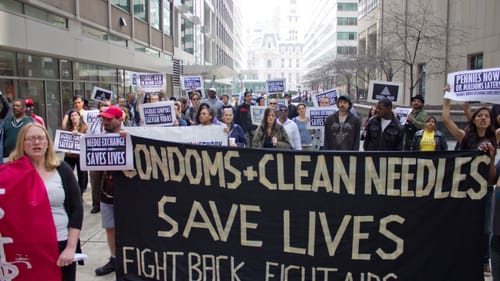Stay in the Loop
BSR publishes on a weekly schedule, with an email newsletter every Wednesday and Thursday morning. There’s no paywall, and subscribing is always free.
What AIDS organizers already know
Philly is still fighting: AIDS, activism, and COVID-19

In July of 1981, Philadelphia Gay News ran its first story about the epidemic that would later be known as AIDS with the headline, “The Latest Gay Disease: Cancer.” Two months later, Philadelphia would have its first case. As the epidemic grew to include drug users, patients who needed transfusions, and, disproportionately, poor African American and Latinx folks, the federal government, headed by President Reagan, did nothing to help, address, or even acknowledge the growing crisis.
As COVID-19 shutters life as we know it for most people and brings disproportionate harm to marginalized communities, what can we learn from the activist networks that came before?
ACT UP ignites
In 1987 Congress passed the Helms Amendment, which banned federal funding of AIDS services, including crucial preventive measures, that it presumed to promote homosexuality. That same year, chapters of the AIDS Coalition To Unleash Power (ACT UP) emerged in New York and spread to cities across the country. ACT UP actions were characterized by a radical queer political worldview, a nonhierarchical leadership structure, and large-scale, theatrical protests.
By 1996, most chapters, fatigued by the deaths of countless members, friends, and lovers, lost momentum or dissolved. When other chapters’ largely white, gay, male membership was tagging out of the fight, Philly’s organization was actively recruiting young members of color. This demographic change brought ACT UP Philadelphia’s membership more in sync with the face of the disease at the time.
One of those members was and is Jose de Marco, an Afro-Latinx AIDS organizer from Philadelphia. I recently had the chance to speak with him about his experiences as a member of ACT UP Philly and his perspective on COVID-19. He came to ACT UP Philly through Philadelphia FIGHT’s Project TEACH (Treatment Education Activists Combating HIV). There, he learned to “organize with communities that were at risk. These were active drug users, African Americans, and Latinos. The leaders of the program had the foresight to see where the epidemic was going. We organized with them and were able to build incredible power through our demonstrations.”
Thinking about early actions he participated in with ACT UP Philadelphia, he recalls going to the home of the director of Public Assistance on World AIDS Day. There, they draped her house in black and had a demonstration. “It was my first time ever speaking at anything like that. I actually had to get drunk first before I did it.”

Structural work
Today, ACT UP Philly continues its legacy of fighting for resources for those living with HIV through a uniquely intersectional lens. Rather than simply work on safer sex education or “HIV prevention 101”, ACT UP Philadelphia is looking at the root structural causes that continue to make the epidemic a major crisis in the United States.
Recently, ACT UP Philly has been working with queer people of color to band together and make demands of larger AIDS Service Organizations. These institutions, like the Mazzoni Center and FIGHT, are large non-profit organizations that receive a tremendous amount of funding from the government at all levels. De Marco says, “There is a lot of racism that goes on in these places. A lot of people don’t understand this, if you’re not a person of color, you’d never get it. We’re calling them out. We want communities to have control over these organizations. Where the money goes. Where the funding goes.”
Prior to COVID-19, ACT UP Philly’s latest campaign was about housing. “When you look at housing, you see everything else that’s so fucked up. You see intersectionality, you see racism, all of it. You see the redlining that goes on. You see all the shitty shit about this country through a housing focus.” According to de Marco, the city is currently not budgeting any money for housing for people with HIV. “The only money that comes into the city is federal money from a program called HOPWA (Housing Opportunities for People with AIDS) and it is really insufficient and it gets cut every year.”
Learning quickly, staying careful
Our current moment makes the situation even more desperate. De Marco says it’s “outrageous” that homeless people, including those with HIV, are on the streets during the pandemic. “We just found out there is a lot of money that came from FEMA to house people ... who can’t practice social isolation. They should be in hotel rooms! There’s money for that.”
When asked how the novel coronavirus is impacting their organizing, de Marco laughs. “We’re all learning online organizing very quickly ... We have to really become experts on this ... We are going to have to get very savvy and very smart.”

Those tactics will include things like “zaps”: a strategy where activists make 500 phone calls or faxes at a time to targeted offices or organizations. They will also continue their brand of investigative activism: “digging up dirt and putting it online.” It all amounts to, as de Marco puts it, “standing on someone’s toe until they say ‘ouch.’” Now, ACT UP Philly has to figure out how to do that without direct confrontation. “We are thinking about how to do in-person actions, but do it safely ... I have AIDS. So I have to be extremely careful.”
What we already know
De Marco is quick to point out that the social reactions to COVID and AIDS are quite different. He feels that the stigma surrounding AIDS was much more intense, but the tactics that will be needed to ensure healthy living for all Philadelphians seem very similar, no matter what the illness. He says that COVID activists will “have to get really, really smart. And start demanding shit from the government. Especially around research and treatment ... This needs to happen immediately. I really think AIDS activists can help push this along because we have the experience. We know how to do it.”
For de Marco and the rest of ACT UP Philadelphia’s membership, COVID-19 is a stark reminder of what they already know: that healthcare in our country is inadequate for those who are poor, that people with minimum-wage jobs don’t have the support they need to call in sick or take care of their families, and that homelessness only makes these problems worse. “All that stuff is happening right now and it always hits all poor people, but it hits poor people of color harder,” he says. “Whether people are noticing this and not just paying lip service to it and actually start doing something” is another question.
Does anything give de Marco cause for hope? “I have very little hope,” he says. “The only hope I have is in November,” when record numbers at the polls could vote the current president out.
Sign up for our newsletter
All of the week's new articles, all in one place. Sign up for the free weekly BSR newsletters, and don't miss a conversation.

 Josh Herren
Josh Herren